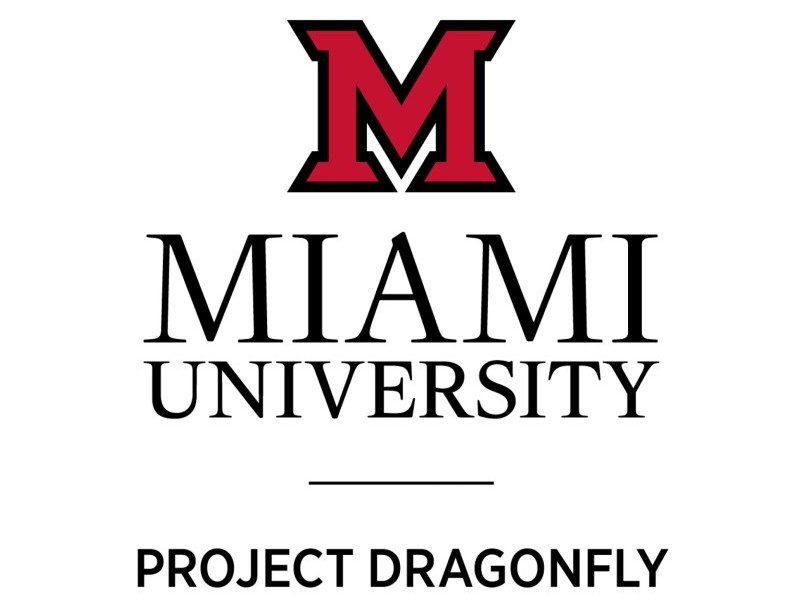Advanced Inquiry Program
The Advanced Inquiry Program (AIP) is a one-of-a-kind, online master’s degree program from Miami University (Oxford, OH) and Project Dragonfly, in partnership with the Cincinnati Zoo & Botanical Garden. Created for working professionals, the AIP immerses students in collaborative inquiry and action as they champion change for the environment and their local community. Through web-based coursework from Miami and face-to-face experiential learning and field study at the Zoo, you will connect with classmates, Miami University faculty, Zoo experts, and community leaders locally, nationally, and globally.
Miami University Master’s Degrees:
- Master of Arts in Teaching (MAT) in Biological Science
- Master of Arts (MA) in Biology
Miami University is fully accredited by the Higher Learning Commission of the North Central Association of Colleges and Schools.
Education programs for all ages foster a sense of wonder, encourage the sharing of knowledge, and advocate active involvement with (and on behalf of) wildlife and wild places. The Cincinnati Zoo actually co-founded Earth Expeditions and the Advanced Inquiry Program with Miami University. By being a Cincinnati Zoo student, you are a part of the founding family!
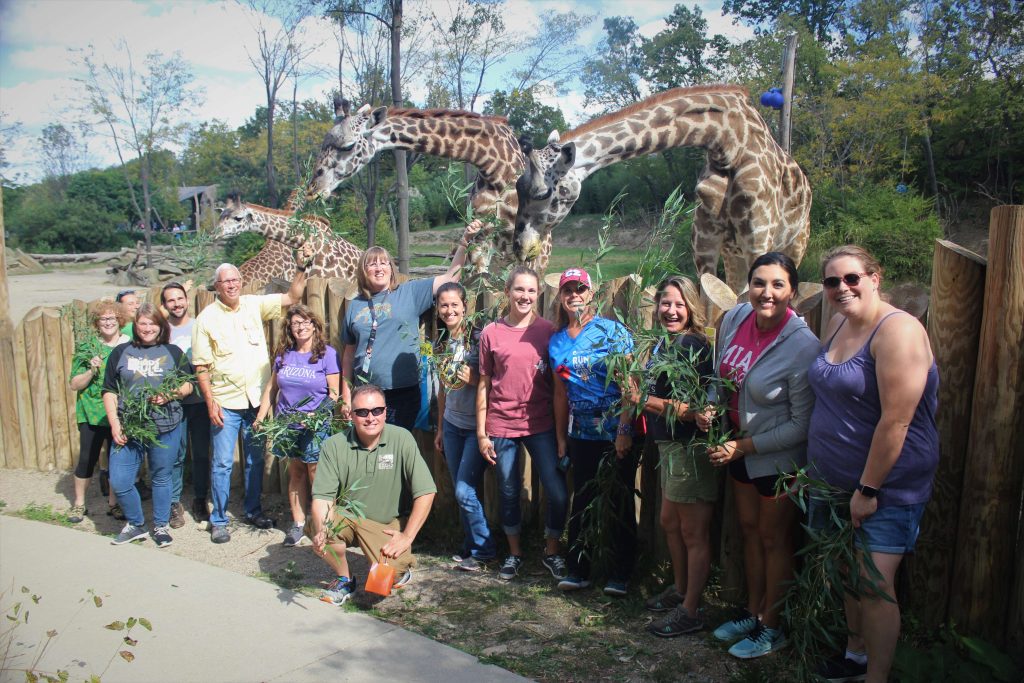
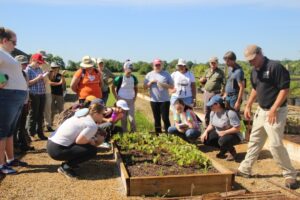 AIP Master’s candidates use inquiry not only as a tool for integrated learning, but as a powerful agent for student achievement, public engagement in science, and ecological stewardship. The AIP is designed for students from a range of backgrounds and career stages. With professional and academic mentoring and self-designed Master Plans, students adapt their degree path to fit their interests in fields such as community-engaged conservation, inquiry-driven education, environmental justice, learning across K-12 and informal settings, animal care and welfare, green business innovation, climate change, urban ecology, human-nature relationships, environmental restoration, and public engagement in science. AIP students join a network of local and national leaders, working together to improve their professions, institutions, neighborhoods, and environments.
AIP Master’s candidates use inquiry not only as a tool for integrated learning, but as a powerful agent for student achievement, public engagement in science, and ecological stewardship. The AIP is designed for students from a range of backgrounds and career stages. With professional and academic mentoring and self-designed Master Plans, students adapt their degree path to fit their interests in fields such as community-engaged conservation, inquiry-driven education, environmental justice, learning across K-12 and informal settings, animal care and welfare, green business innovation, climate change, urban ecology, human-nature relationships, environmental restoration, and public engagement in science. AIP students join a network of local and national leaders, working together to improve their professions, institutions, neighborhoods, and environments.
Degree Conferred. Students can enroll in either a Master of Arts in Teaching (M.A.T.) in the biological sciences for formal K-12 teachers or a Master of Arts (M.A.) in biology for all other professionals. The M.A.T. does not confer a teaching license. Miami University is fully accredited by the Higher Learning Commission of the North Central Association of Colleges and Schools.
 Students take a combination of 21 credit hours of Web+ Courses (online with in-person Zoo experiences) and 14 credit hours of Core Courses (online only) taken with Project Dragonfly master’s students nationwide via web-based learning communities. All 35 hours include a web-based learning community and a Miami University instructor. Several courses also include experiential learning time on grounds at the Cincinnati Zoo & Botanical Garden or at sites across the Greater Cincinnati area. Periodic travel (~4 times a semester) to Cincinnati is expected and a required portion of the courses. Students complete a master’s portfolio (our version of a master’s thesis) throughout their time in the program based on an overarching theme or passion/interest they want to apply their various course projects toward. AIP students in their 3rd year and in good standing are eligible to apply for an Earth Expeditions course to learn firsthand about community conservation efforts across the globe.
Students take a combination of 21 credit hours of Web+ Courses (online with in-person Zoo experiences) and 14 credit hours of Core Courses (online only) taken with Project Dragonfly master’s students nationwide via web-based learning communities. All 35 hours include a web-based learning community and a Miami University instructor. Several courses also include experiential learning time on grounds at the Cincinnati Zoo & Botanical Garden or at sites across the Greater Cincinnati area. Periodic travel (~4 times a semester) to Cincinnati is expected and a required portion of the courses. Students complete a master’s portfolio (our version of a master’s thesis) throughout their time in the program based on an overarching theme or passion/interest they want to apply their various course projects toward. AIP students in their 3rd year and in good standing are eligible to apply for an Earth Expeditions course to learn firsthand about community conservation efforts across the globe.
The fastest pace this degree can be completed is in 2.5 years, but students have up to 5 years (consecutively) to finish their coursework, so you can choose to go at a slower pace with lighter courseloads per semester if needed.
To see the general course of study, click here; for a Cincinnati Zoo-specific example, please click here.
To support involvement by a broad range of educators and conservation professionals nationally, Miami University offers significantly reduced tuition for AIP web-based classes. The current cost for this Miami University master’s degree is roughly 30% less than the cost of a Miami master’s for an Ohio resident. Dragonfly‘s many students who live outside Ohio realize an out-of-state savings of approximately 70%.
Miami University/Project Dragonfly rates – Summer 2024 – Spring 2027 cycle
- Core Course (online only) – $455 per credit hour
- Web+ Course (online + in-person Zoo time) – $580 per credit hour
For example, a 3-credit Conservation Science & Community class (Core Course) would cost $1,365, while a 3-credit Animal Behavior & Conservation class (Web+ Course) would cost $1,740. The rates shown reflect a 3-year tuition commitment from Miami University for the period from Summer 2024 to Spring 2027. Costs are estimates and subject to change.
For more information, please see Project Dragonfly’s AIP Costs page.
Offsetting Costs
With reduced fees as part of Miami University’s support for this program, each AIP course is offered at a fraction of actual costs. Applicants to the program should check with their employer to see if professional development funds are available to further offset costs. A limited number of small scholarship funds (in the range of $250-$500, varying by year) are available to current AIP students. Scholarship descriptions and application information is distributed by email to all students in late spring of each year.
If you have further questions about financial assistance (ex. federal loans, deferrals), please refer to Project Dragonfly’s “Helping Fund Your Degree” page for more. The Zoo does not handle student finances.
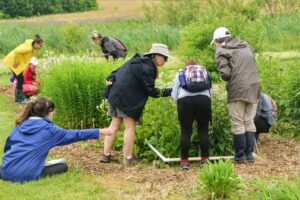 Who is Eligible?
Who is Eligible?
Bachelor’s degree and undergraduate GPA of good standing. Enrollment is open to applicants with a bachelor’s degree, regardless of academic major. For admission to Miami’s Graduate School as a degree candidate, you must have earned a grade point average (GPA) of at least 2.75 (4.0 scale) at the institution awarding your bachelor’s degree. Please visit the Miami University Graduate School’s Admissions page for more details.
Reliable internet access. Because all courses are delivered primarily online, access to the internet is required.
General university-level biology course. All M.A. in Biology and M.A.T. in Biological Sciences students are required to have completed (receiving a final grade of B- or better) one university-level general biology course or its equivalent prior to completion of their M.A./M.A.T. degree. Students admitted to the program who have not previously met this requirement through their undergraduate studies will need to complete such a course before they graduate. The Dragonfly Graduate Committee highly recommends that students complete this requirement within the first two years of the master’s program. More information may be found in the Biology Requirement FAQs and on the Biology through Inquiry webpage.
Application Process
Applications for the AIP go live every September for the following cohort year, with classes starting in May. Part of the preliminary process includes filling out a short interest form which helps us gauge general interest in the program. All application materials are due to Miami University’s Graduate School by February 28 of each year.
Applicants will be notified about their recommendation for admission to the program by April 15. Your admittance into the program is not final until you receive the official letter from the Graduate School of Miami University.
NOTE to prospective applicants: Your very first course as an AIP student called Foundations of Inquiry includes a week-long session at the Zoo in early June. For the incoming 2024 cohort, FOI Zoo Week is set for June 3 – 7, 2024, and full attendance is required for all students. This in-person week is an integral part of the program, so full attendance is expected and no make-up opportunities are given for missed days, regardless of the reason.
Want to learn more? Sign up for a Virtual Info Session
Join a live, 45-minute info session and learn about the key elements of an AIP student experience with Miami University and the Zoo. There will be a presentation by the Zoo’s AIP Manager followed by an open Q&A session. Please have the most recent version of Zoom downloaded on your device to participate. Register by clicking the link below for your preferred date (all in EST time zone). We will record each session and email a copy to any registered attendees.
Wednesday, October 18 at 7:00pmTuesday, November 28 at 7:00pmThursday, January 11, 2024 at 7:00pmWednesday, February 7, 2024 at 7:00pm
Is this program for you?
For general questions about the AIP, see Project Dragonfly’s main FAQ page.
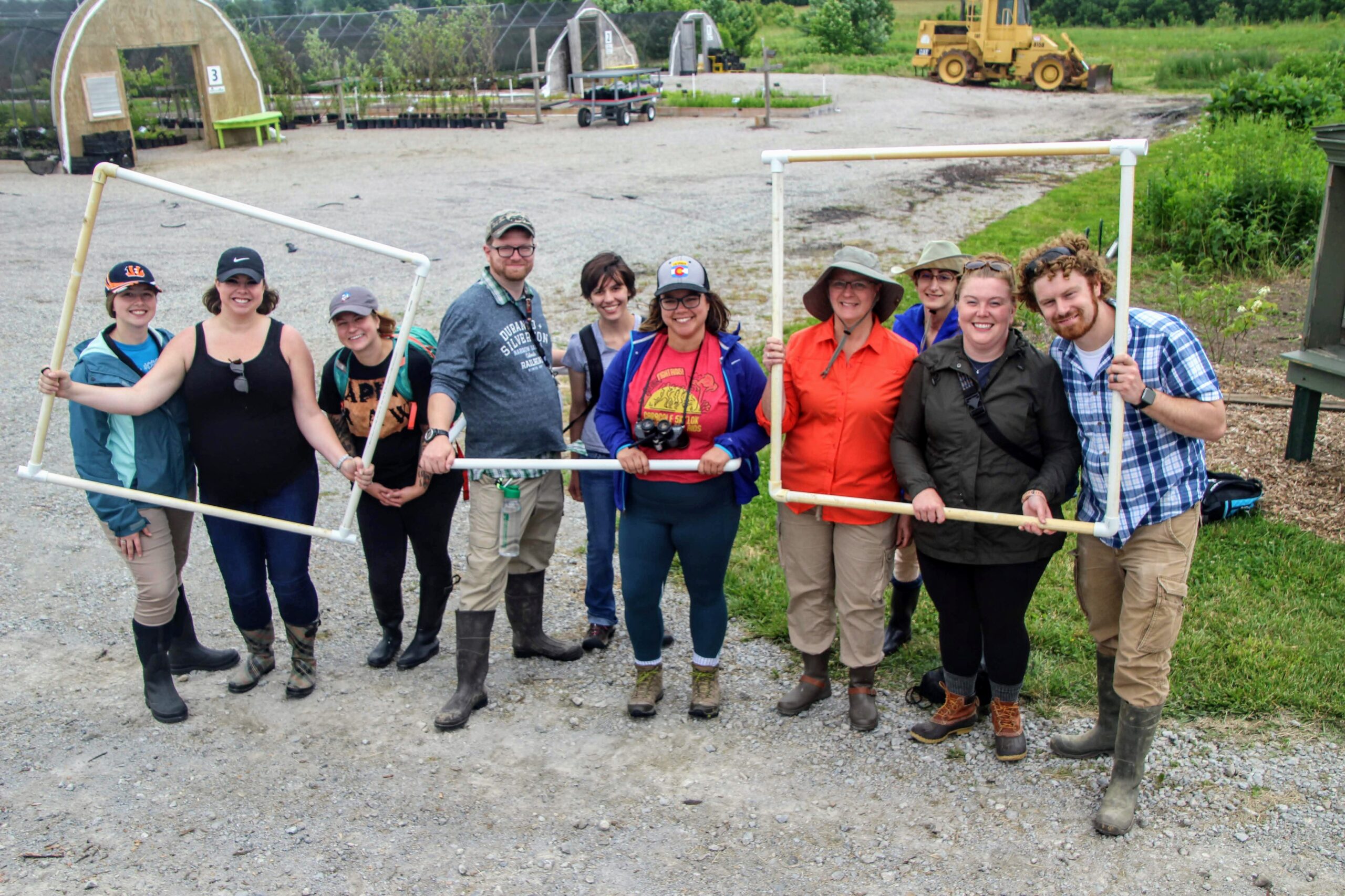
AIP students earn their master’s degree from Miami University (Oxford, OH) through web-based courses taught by Miami instructors with the excitement of experiential learning in person at an AIP site like the Cincinnati Zoo & Botanical Garden. By providing invaluable community connections, expertise, and environmental leadership, AIP sites are at the heart of the AIP.
At the heart of this program is making an environmental and social change in your community, whatever “community” means to you (your neighborhood, school district, workplace, zoo, nature center, metropark, city, faith family, etc.). We encourage a lot of inquiry-based learning and our courses revolve around environmental topics and how to communicate and share those issues. In large part, students drive their own master’s experience through projects they design, so what a student ends up focusing on depends on where he or she wants to go. Students also develop specific content knowledge and skills in the realms of biodiversity threats and conservation, evolution, community engagement, inquiry-based education, science writing and publishing, and leadership, among many others.
- The AIP consists of Course Courses (online) and Web+ Courses (online w/Zoo time). All courses are delivered online by a Miami University instructor. Several courses also include experiential learning time on grounds at the Cincinnati Zoo & Botanical Garden, at other Z facilities, or at sites across the Greater Cincinnati area. Occasional travel to Cincinnati (~4 times a semester) is expected. We try to do most of our in-person Zoo components on Saturdays for those who work during the week or have to travel to Cincinnati. Usually, you only have “Zoo Days” about 4 times spread out in a semester. None of the courses require you to travel to the main Oxford campus of Miami University.
- There are two Web+ Courses where the Saturday rhythm deviates:
-
- Foundations of Inquiry – The very first Web+ course you take as a student includes a full M-F week at the Zoo (full 9 am to 4 pm days). It is a required, large piece of the experience and foundational to the program in general.
- Barrows Conservation Lecture Series Seminar – A spring course that involves coming to the Zoo for 4 lectures typically on Wednesday evenings to hear from internationally-known conservationists.
- We do have many students in our program who do not live in Greater Cincinnati, coming from all over Ohio, Kentucky, Indiana, Michigan, Tennessee, Virginia, and even places like Florida and Maine. As long as you plan ahead and make the trek to Cincinnati for each course’s in-person components (typically 4 times a semester), you can live practically anywhere.
I have a full-time job and/or a family and other life commitments I’m responsible for. Is this program still doable? Is it possible to take a semester off here and there when needed?
- This program was designed to be accomplished at a part-time pace for working or busy individuals, and many of our students graduate while juggling all of the above as well. It is important to note, as with all graduate school endeavors, that it will definitely be a significant commitment that will require your time and attention, so take stock of your availability and ensure you carve out time weekly to tackle your assignments and project work. Time management is key in this program.
- As for life happening, which it often does, it’s not uncommon for students to take a lighter load occasionally or even take a full semester or two off while things in their personal/work life settle. Students just have to plan to finish within 5 years from when you started the program.
There isn’t really a way to accelerate the time period for the degree. Usually, each semester students take at least 2 courses, and that’s proven enough/a lot for most, as it was designed to be done on a part-time basis knowing that most of the students in our non-traditional program are also juggling jobs, perhaps families, and other life commitments, etc. Plus, a really big element of the program is community engagement: collaborating with people in your circles or making new connections to tackle community-based work – and that relationship-building and project implementation takes time. Going too quickly through the program would counteract that goal, and that relationship-building process is also how some students end up with job opportunities. It may seem like a long time upfront, but students often reflect upon how quickly it goes!
I’m not ready to jump into a full master’s degree quite yet. Is there a way to check out the courses for a semester or just earn standalone Miami graduate credit for professional development/recertification purposes?
Yes! We open up a few of our AIP courses to non-AIP students each year. This allows those who want to check out the program to see what it’s like or also allows those who are just looking for graduate credit opportunities for professional development to join our unique experiences. Try out a standalone graduate course and join us for a semester!
We typically accept only 20-25 students per cohort each year. Graduate students in our program come from a variety of backgrounds. We see formal and informal educators, stay-at-home parents, retail and food service employees, administrative assistants, financial consultants, retirees, health care workers, recent graduates from college, EPA specialists, nature center educators, animal care professionals, and more. It’s great having variety in our cohorts, especially since at the end of the day, we all have an appreciation for conservation, the environment, and education.
- In addition to making numerous new contacts and friends, and diving into a world of environmental studies, two major themes come out of this program – leadership and community engagement. Throughout the various courses and assignments, students are asked to tackle issues and topics they’re passionate about and are also asked to dream bigger and push themselves beyond their normal day-to-day routines.
- Through our Project Dragonfly family, students have gone on to receive grants, create brand new events or programs in their communities, collaborate with sanctuaries and preserves, take on leadership roles at work or promotions, write books, improve husbandry practices at zoos, etc. This program creates opportunities for people to do and explore the things they’ve always wanted to do.
Possibly. It depends on what field a student wants to get a Ph.D. in. Because this is a Miami Master of Arts degree program, if you are trying to go for a Ph.D. in a science field with a heavy research base like biology, chemistry, etc., it might be tougher to find a Ph.D. program that will accept an M.A./M.A.T. over an M.S. On the other hand, going into a Ph.Ed. or a Ph.D. in Environmental Studies, Sustainability Leadership, etc. would be more feasible. If you have an advisor or Ph.D. program that you’re interested in already, we recommend talking with them and seeing what their initial thoughts are. In addition, because this is a non-traditional academic program, it might require educating the Ph.D. department/university in question a bit more about what the AIP is about and helping them understand what we accomplish, coursework, philosophies, etc. Any Ph.D. program advisor is welcome to reach out to Project Dragonfly’s leadership team at Miami University to inquire further.
Can I apply before I graduate with my bachelor’s degree? Do I need to take the GRE for this program?
- Yes! During the application process, just upload your most recent version of your unofficial transcripts. Then, you will need to submit a final transcript to Miami University after your acceptance into AIP and graduating with your bachelor’s degree, but you can certainly apply during the final year of your undergraduate degree program.
- No – no GRE is needed for your application to this program.
- This and the other career-related questions below are ones we receive often. As with most careers, it depends on the mixture of your relevant experience, academic background, and skills. This experience would expose to you people, places, issues, projects, challenges, inspirations, and more that no other graduate program would.
- Being in this program would give you deeper background on related topics and will connect you to new contacts and opportunities (i.e. volunteering, possible part-time work, internships, etc.), but graduating from the program does not guarantee a job either. It is up to you to make the most of any possibilities that come available and add relevant experience to your resume. Ask yourself if this program material/content would be interesting to you beyond solely looking for a career change: Would the time and effort be worth it regardless of what happens?
- Not with this degree alone. Keeper positions require extensive experience in animal husbandry and animal science. These qualifications often include college degrees these days, but also heavily relies on hands-on, practical work experience in animal husbandry (at a zoo/aquarium, farm, animal shelter, sanctuary, etc.) or veterinary medicine. Without this experience, there is simply no stand-alone degree that will get you a keeper position.
- The AIP will help build you up in terms of conservation content, leadership skills, and networking possibilities, but our courses do not focus on “how to be a zookeeper” or put you in any direct animal care scenarios. Those skills only really come from volunteer/internships and work experiences or being at a teaching or trade school specifically for animal care (like the Santa Fe College Teaching Zoo in Florida).
Potentially, but no guarantees. You’ll definitely meet Zoo staff and learn about opportunities along the way, but jobs at the Zoo are hard to come by (especially full-time ones). Because it’s an internationally-recognized Zoo and a center for wildlife conservation, job openings at the Zoo are promoted far and wide so that the very best candidate can be found. So, even though you may hear about a job opening as soon as it opens up because you are an AIP student, you’ll be considered along with the rest of the candidates that apply.
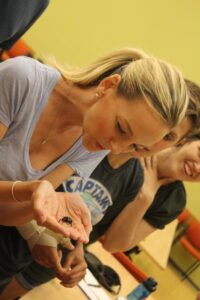
I want to become a conservation biologist and help protect wildlife. Will AIP help me achieve this?
- In part. The AIP, being a Master of Arts degree, leans more towards those in the environmental studies and community engagement realm versus building up large amounts of field methods skills. Being able to communicate conservation plans to the public requires you to know how to engage people in conservation issues. So, AIP will certainly enhance your career as a conservation biologist, but you’ll need more pure conservation research experience before you’ll be ready to find a job as a conservation biologist.
- That being said, the M.A. degree is pretty open to interpretation and is often largely impacted or influenced by the projects, experiences, and new contacts you create while you’re in the program. So if field conservation is your passion, and you work to leverage your projects and community partnerships to support those goals, then you could use this degree program to build the hands-on experience and the academic background you’re looking for.
Limited potential, but possible for the right candidate. The AIP master’s journey does not include direct animal care or training with animals as a part of the degree. However, there are a variety of volunteer and internship positions available at the Zoo, and many of these could lead to opportunities to work more closely with our animal ambassadors. Learn more about becoming a Zoo Volunteer.
Graduate Credit Courses
Earn standalone graduate credit through Miami University while spending time at the Zoo!
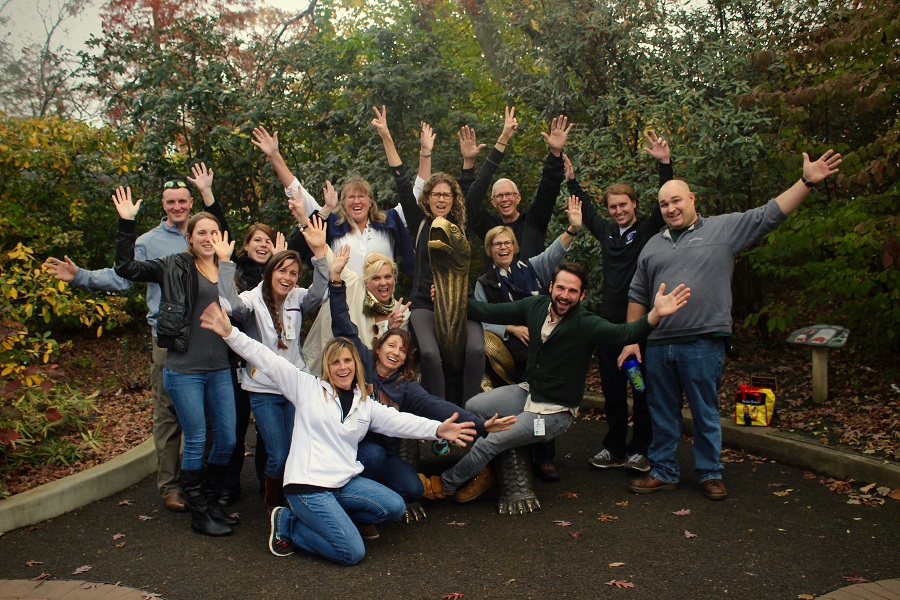
Combine primarily web-based graduate coursework through Miami University (Oxford, OH) with unique experiences at the Cincinnati Zoo & Botanical Garden, connecting you to a broad network of like-minded individuals and community leaders. With Project Dragonfly, we proudly bring you exciting, inquiry-driven topics ranging from animal behavior and plants in society to the complex human dimensions of conservation.
This suite of “Web+” courses merge the academic expertise of Miami University instructors with the world-class wildlife conservation and botany expertise of the Cincinnati Zoo & Botanical Garden. Classes offer participants the opportunity to develop inquiry-based learning skills and provide them with exciting course content in a variety of subject areas.
Miami University is fully accredited by the Higher Learning Commission of the North Central Association of Colleges and Schools.
What is the nature of these AIP courses and their associated projects?
At the heart of this program is making an environmental and social change in your community, whatever “community” means to you (your neighborhood, school district, workplace, zoo, nature center, metropark, city, faith family, etc.). We encourage a lot of inquiry-based learning and our courses revolve around environmental topics and how to communicate and share those issues. In large part, students drive their own master’s experience through projects they design, so what a student ends up focusing on depends on where he or she wants to go. Students also develop specific content knowledge and skills in the realms of biodiversity threats and conservation, evolution, community engagement, inquiry-based education, science writing and publishing, and leadership, among many others.
Summer (mid May – early Aug) – Register March 1 – 30
- Environmental Stewardship: Issues in Cincinnati Conservation – This course focuses on conservation issues currently facing the Cincinnati Tri-State area, and will allow participants to design their own conservation behavior-focused “Life Change” projects. Students will also get the opportunity to interact with professionals in the sustainability and conservation realm. 3 graduate credits – online course & four Saturdays in-person
Fall (late Aug – early Dec) – Register June 1 – 30
- Plants & People – Students examine the deep human connection to plants, the importance of nature and natural places to child development, and plant ecology & conservation – all while surrounded by thousands of species of plants. Students will design and execute a related Inquiry Action Project (IAP) throughout the semester. 3 graduate credits – online course & four Saturdays in-person
- Animal Behavior & Conservation – This course provides students with a wealth of content on animal behavior and conservation while giving them the opportunity to study a diversity of animal species. Students will design and execute a related Inquiry Action Project (IAP) throughout the semester. 3 graduate credits – online course & four Saturdays in-person
- Human Dimensions of Conservation – Conserving wildlife is a complex endeavor that requires the integration of both social and natural sciences. Students consider how current conservation issues can be addressed through an understanding of human thought and action. Students will design and execute a related Inquiry Action Project (IAP) throughout the semester. 3 graduate credits – online course & four Saturdays in-person
Spring (late Jan – early May) – Register November 1 – 30
- Barrows Conservation Lecture Seminar – The spring graduate seminar centers around the Zoo’s popular Barrows Conservation Lecture Series. This course gives you the chance to learn about global conservation efforts and attend 4 weekday evening lectures led by world-famous researchers, conservationists, explorers, and teachers. Students will create a Curiosity Synthesis project to dive into speaker topics and related themes. 2 graduate credits – online course and four weekday evenings in-person
Registration is a multi-step process:
- Non-matriculated students (those not seeking a full master’s degree) must first apply to Miami’s Graduate School for “Continuing Graduate Status” (CGS) admission.
- The Graduate School will review the application and, upon approval, will send the applicant a letter of CGS admission. Please note that CGS admission does not confer or imply admission to the AIP; this approval simply allows the student to enroll in graduate-level courses without pursuing a graduate degree.
- After completing the steps shared by Miami, further information will be sent to you, including a link to the CGS registration form. All steps must be completed to alert us of your application and to create a student record with the university.
Please note that space in courses is limited and closed once they reach capacity. Your placement is not confirmed until you have completed Miami CGS admission and course-specific registrations.
Miami University is fully accredited by the Higher Learning Commission of the North Central Association of Colleges and Schools. To support involvement by a broad range of educators and conservation professionals nationally, Miami University offers significantly reduced tuition for AIP web-based classes.
Miami University/Project Dragonfly Summer 2024 – Spring 2027 rates
- Web+ Course (online + in-person Zoo time) – $580 per credit hour
For example, a 3-credit Animal Behavior & Conservation class (Web+ Course) would cost $1,740. The rates shown reflect a 3-year tuition commitment from Miami University for the period from Summer 2024 to Spring 2027. Costs are estimates and subject to change. For information, please see Project Dragonfly’s AIP Costs page.
For more information, please see Project Dragonfly’s FAQs.
- What is the nature of these courses and their associated projects
At the heart of this program is making an environmental and social change in your community, whatever “community” means to you. With experts onsite at the Zoo and Miami University instructors on the web, these graduate courses enable students to interact with peers, program alumni, and community leaders and explore new frontiers in community-engaged learning. In addition to the face-to-face experiences at the Zoo, participants also engage weekly online to discuss assignments, course readings, and semester-long research projects. We encourage a lot of inquiry-based learning and our courses revolve around environmental topics and how to communicate and share those issues. - I have a full-time job and/or a family and other life commitments I’m responsible for. Is it still possible to take a graduate course concurrently?
These primarily web-based courses were designed to be accomplished at a part-time pace for working or busy individuals, and many of our AIP master’s students and CGS students successfully complete courses while juggling all of the above as well. It is important to note, as with all graduate credit endeavors, that it will definitely be a significant commitment that will require your time and attention, so take stock of your availability.
Contact Us
At Cincinnati Zoo & Botanical Garden
- Jerran Orwig, AIP Manager, Conservation Impact
- [email protected]
- 513-475-6171
At Miami University
- Connie Malone, Project Dragonfly, Department of Biology
- [email protected]
- 513-529-5103

